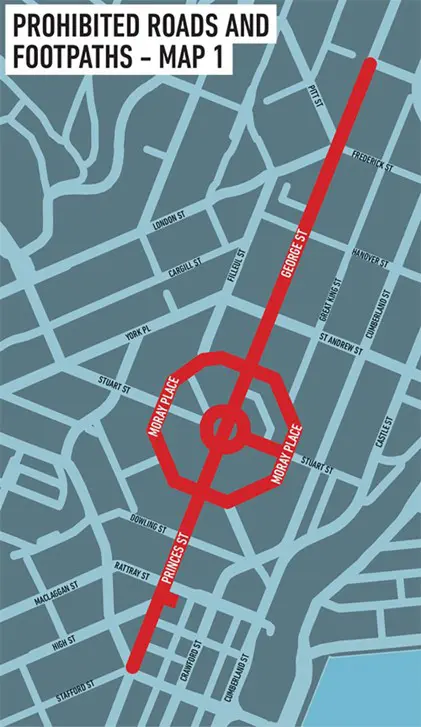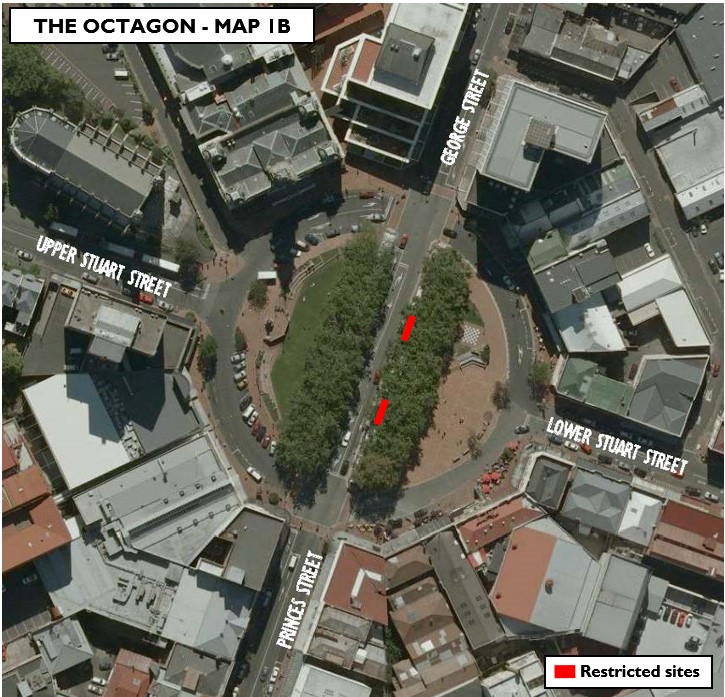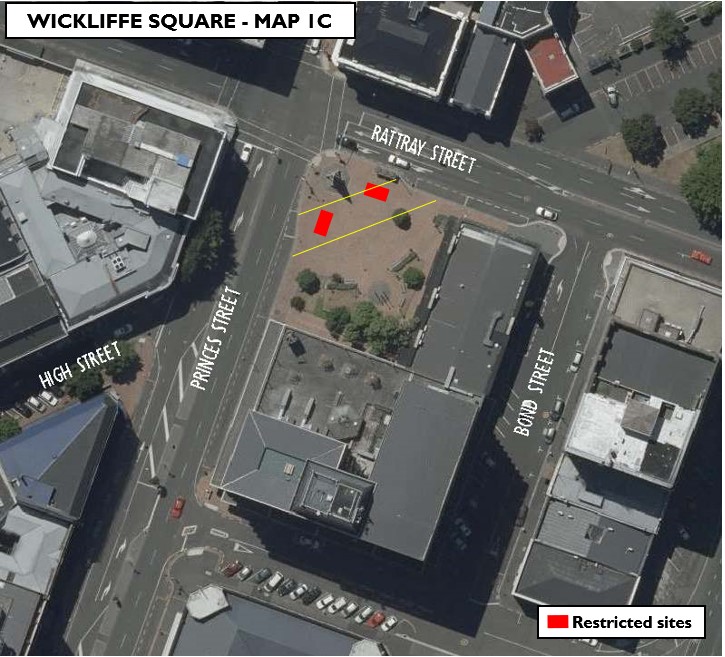The Trading in Public Places Bylaw requires a permit to carry out mobile shop trading. This document sets out permit conditions.
The conditions detailed in this document do not apply to the commercial use of footpaths, hawking, peddling or touting, which have separate permit processes.
Contact Dunedin City Council on 03 477 4000 or email dcc@dcc.govt.nz to apply for a permit.
Purpose
Street trading adds to Dunedin’s character, vibrancy and visitor experience. The Trading in Public Places Bylaw and conditions aim to ensure public places are safe, lively and attractive, while allowing people to move around safely and easily.
General
The Dunedin City Council may approve a permit based on but not limited to the following conditions and considerations. Permits may be granted only for property which the Council controls. All permit holders must also comply with relevant legislation and bylaws including the Health and Safety at Work Act, Food Act, Resource Management Act, the Dunedin City District Plan (2GP), Land Transport Act, and Traffic and Parking Bylaw. They must comply with all regulations, standards and codes of practice relating to the storage and use of LPG, electricity and any other power source.
Definitions
In accordance with the Trading in Public Places Bylaw, "mobile shop trading" includes:
- trading from a mobile shop
- trading from a stall or temporary stall.
"Bylaw" means the Trading in Public Places Bylaw
"Footpath" means the part of the road built mainly for pedestrians and includes the edging, kerb and channelling.
"Mobile shop" means a vehicle or motor vehicle from which goods or services are offered or presented for sale or hire, lease or other use, or from which goods or services may be ordered. It does not include a service delivery vehicle carrying goods which have been ordered.
"Motor vehicle" and "vehicle" have the same meaning as in section 2(1) of the Land Transport Act 1998.
"Operator" means the permit holder and/or other person in charge of the business.
"Pedestrian access" means a minimum width of unobstructed access for pedestrians must be maintained as follows: 3m in the central business district zone of the 2GP and 1.5m in all other areas.
"Public place" means an area that is of a public nature, is open to or used by the public, and which is owned, managed, maintained or controlled by the Council. It includes any road, street, footpath, court, alley, lane, park, recreation ground, sports field, reserve, beach, pedestrian mall, cycle track, accessway, squares and carparks.
"Reserve" means any reserve or park that is subject to the provisions of the Reserves Act 1977 or the Local Government Act 2002.
"Road" has the same meaning as in section 2(1) of the Land Transport Act 1998.
"Service delivery" vehicle means any vehicle used to deliver goods to the premises of any person, business or organisation, but which is not involved in the direct sale of goods to the general public.
"Stall" means any structure such as a barrow, table, display board or portable stand, used to sell goods, and includes temporary stalls for one-off occasions.
Conditions
Conditions for a permit application
1.1. Every applicant must apply in writing and provide all the information requested.
1.2. Every applicant must provide a copy of their public indemnity or liability insurance which must be kept current.
1.3. The operator will compensate the Council for any damage they cause to Council property or for any other expense incurred by the Council to ensure compliance with these conditions.
1.4. The operator is solely liable for claims of damages that may arise from their mobile shop trading activity.
1.5. Every applicant must clearly state the type of food, goods, merchandise or other articles or services that would be available for sale.
1.6. Applicants with more than one mobile shop must have a separate permit for each mobile shop.
Conditions when operating
2.1. When trading, each operator must ensure their current permit is always prominently displayed. The permit must also be available to any authorised officer or police officer on request.
2.2. The right to occupy a mobile shop trading location on any day, or part of a day, will be determined on a 'first come basis'. This does not apply to areas of parks and reserves, prohibited roads and footpaths, or restricted sites where, in addition to a permit separate permission to operate is required.
2.3. Mobile shop traders must operate safely to make sure they don’t impede traffic and pedestrian flows.
2.4. Operators will take all practicable steps to ensure the health and safety of people within the immediate vicinity of the operator’s trade or business.
2.5. At the end of the permitted working day, operators must leave the site in a clean and tidy manner.
2.6. Signage or goods may not be placed on a footpath, or in the vicinity of the mobile shop, by operators without the Council’s prior permission.
2.7. Operators must ensure that pedestrian access is maintained at all times and that they, and their audience and clients, do not block doorways, bus stops, fire escapes, roads and accessways. A mobile shop must operate within Land Transport Act requirements, eg not within 6m of a road intersection including any pedestrian or traffic signals.
Restrictions
3.1. The operator of any mobile shop must not occupy any general location, i.e. legal park, for more than 12 hours in any 24 hour period.
3.2. Mobile shop trading on private property is permitted only with the property owner’s permission.
3.3. Operators may not approach people to sell goods or services in a way that is likely to make people feel uncomfortable.
3.4. Should the operator leave the mobile shop unattended beyond the permitted daily 12 hour period, attempts will be made to contact the operator and request they move the mobile shop. If the operator cannot be contacted or does not comply with the request, an authorised officer will move the mobile shop. The operator will compensate the Council for any expense incurred associated with the removal.
Prohibited and restricted areas
4.1. Mobile shop trading is not permitted in the following prohibited roads and footpath trading areas, shown in schedule A map 1, which are:
- George Street from the Octagon to Albany Street
- Princes Street from the Octagon to Jetty Street
- Lower Stuart Street from the Octagon to Moray Place
- Moray Place
- The Octagon, except for restricted sites outlined in schedule B.
- Wickliffe Square, except for restricted sites outlined in schedule B.
4.2. Mobile shop trading is only permitted in the following restricted trading areas with the expressed permission of Council:
- 4.2.1. Parks or reserves which require appropriate permission under the Reserves Act 1977. A list of parks and reserves is available at www.dunedin.govt.nz.
- 4.2.2. The specified sites in the restricted trading areas, shown in schedule B, maps 1a, 1b and 1c, which include:
- Museum Reserve (specified sites only)
- The Octagon (specified sites in central carriageway only)
- Wickliffe Square in the Exchange (specified sites only).
4.3. Applications for permission to carry out mobile shop trading on a restricted area, and applications for the creation of new restricted sites, will be considered on a case by case basis.
Conditions for public reserves and parks
5.1. This section should be read in conjunction with the Reserves Management Plan – General Policies, March 2005.
5.2. Public reserves and parks including associated car park areas, are not usually available for mobile shop trading activity. The Council may occasionally allow applications for the use of these public places where the trade, business or occupation is deemed not to detract from the primary purposes of the reserve or park and does not adversely impact on the reserve or park, its use, the values for which it is held or on reserve or park neighbours.
5.3. All applications to operate trading activities on reserves must be made to the Council in writing.
5.4. No one may carry out any trading activity on a park or reserve without written permission and booking of a designated mobile shop trading space.
5.5. The Council has identified some specific areas where mobile shop trading is allowed in parks and reserves. In addition to obtaining written permission, all operators must book these spaces in those specific areas through DCC Parks and Recreation Services.
5.6. The permit must be displayed within the mobile shop at all times.
5.7. Unless otherwise stipulated, all operators are required to be self-contained including water supply.
5.8. Operators must provide their own power source and remove their own rubbish.
5.9. Operators must fix any damages that arise from their occupation of the space. Operators must use a DCC approved contractor for this work.
5.10. Permits may be reviewed and potentially terminated where the designated mobile shop trading space is unused for an extended period of time or for any breach of the bylaw, these conditions, the permit conditions or the booking requirements.
Indemnity
6.1. Any costs related to damage, loss or injury caused by the permit holder or any person acting on their behalf are to be paid by the permit holder.
Permit fee and renewal
7.1. Every application must be accompanied by the application fee set out in the list of “Fees and Charges” accessed by visiting www.dunedin.govt.nz.
7.2. A mobile shop trading permit, issued subject to the Trading in Public Places Bylaw and these conditions and any other relevant legislation, is valid for 12 months from the date of issue.
7.3. Council may refuse to issue a mobile shop trading permit where the applicant has breached the permit provisions in the past six months.
Right of review
8.1. Any applicant who is dissatisfied with a Council decision made in relation to the applicant under these conditions may appeal the decision under the terms stated in the Trading in Public Places Bylaw.
SCHEDULE A
Prohibited roads and footpaths
Prohibited roads and footpaths where mobile shop trading is not permitted unless exceptional permission is given by the Council are:
- George Street from the Octagon to Albany Street
- Princes Street from the Octagon to Jetty Street
- Lower Stuart Street from the Octagon to Moray Place
- Moray Place
- The Octagon, except for specified restricted spaces in central carriageway only (see Map 1B)
- Wickliffe Square, except for specified restricted spaces only (see Map 1C)

SCHEDULE B
Restricted sites where mobile shop trading requires permission of council
Restricted sites where mobile shop trading requires permission of Council are:
- Museum Reserve (specified spaces only)
- The Octagon (specified spaces in central carriageway only)
- Wickliffe Square in the Exchange (specified spaces only)
Museum Reserve - Map 1A

The Octagon - Map 1B
There are two sites on the Octagon bus parks, located on the lower side of the Octagon central carriageway.
Traders must park at the George Street end (Site 1) or Princes Street end (Site 2) - not in the middle.
Sites will not be available when cruise ships are in port, or when the central carriageway is closed for an event.

Wickliffe Square - Map 1C
There are two sites at Wickliffe Square.
There is no vehicle crossing so access is from the bus parking on Princes Street or the P5 on Rattray Street. A wedge must be placed in the gutter at the access point to avoid damage to the kerb. The towing vehicle may be driven onto the site for setup, but must stay between the yellow lines shown below as there is a cavity under the square where historic public toilets were located. This has been filled, however pavers may sink if driven on. The area between the yellow lines below is road reserve and solid.
The towing vehicle must be removed from the site as soon as the unit has been set up.

